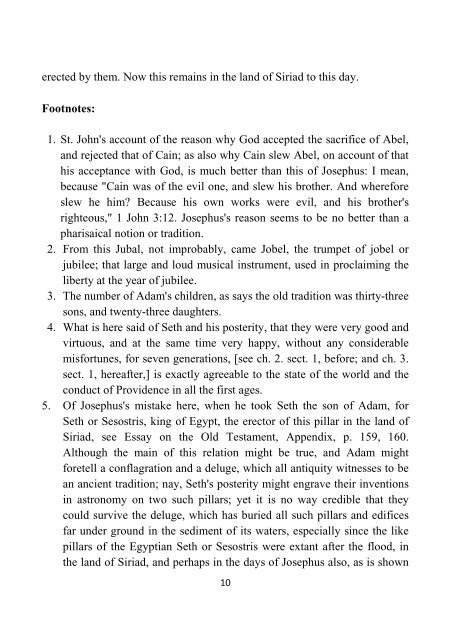From the Creation to the Death of Isaac - Flavius Josephus
- No tags were found...
You also want an ePaper? Increase the reach of your titles
YUMPU automatically turns print PDFs into web optimized ePapers that Google loves.
erected by <strong>the</strong>m. Now this remains in <strong>the</strong> land <strong>of</strong> Siriad <strong>to</strong> this day.<br />
Footnotes:<br />
1. St. John's account <strong>of</strong> <strong>the</strong> reason why God accepted <strong>the</strong> sacrifice <strong>of</strong> Abel,<br />
and rejected that <strong>of</strong> Cain; as also why Cain slew Abel, on account <strong>of</strong> that<br />
his acceptance with God, is much better than this <strong>of</strong> <strong>Josephus</strong>: I mean,<br />
because "Cain was <strong>of</strong> <strong>the</strong> evil one, and slew his bro<strong>the</strong>r. And wherefore<br />
slew he him? Because his own works were evil, and his bro<strong>the</strong>r's<br />
righteous," 1 John 3:12. <strong>Josephus</strong>'s reason seems <strong>to</strong> be no better than a<br />
pharisaical notion or tradition.<br />
2. <strong>From</strong> this Jubal, not improbably, came Jobel, <strong>the</strong> trumpet <strong>of</strong> jobel or<br />
jubilee; that large and loud musical instrument, used in proclaiming <strong>the</strong><br />
liberty at <strong>the</strong> year <strong>of</strong> jubilee.<br />
3. The number <strong>of</strong> Adam's children, as says <strong>the</strong> old tradition was thirty-three<br />
sons, and twenty-three daughters.<br />
4. What is here said <strong>of</strong> Seth and his posterity, that <strong>the</strong>y were very good and<br />
virtuous, and at <strong>the</strong> same time very happy, without any considerable<br />
misfortunes, for seven generations, [see ch. 2. sect. 1, before; and ch. 3.<br />
sect. 1, hereafter,] is exactly agreeable <strong>to</strong> <strong>the</strong> state <strong>of</strong> <strong>the</strong> world and <strong>the</strong><br />
conduct <strong>of</strong> Providence in all <strong>the</strong> first ages.<br />
5. Of <strong>Josephus</strong>'s mistake here, when he <strong>to</strong>ok Seth <strong>the</strong> son <strong>of</strong> Adam, for<br />
Seth or Sesostris, king <strong>of</strong> Egypt, <strong>the</strong> erec<strong>to</strong>r <strong>of</strong> this pillar in <strong>the</strong> land <strong>of</strong><br />
Siriad, see Essay on <strong>the</strong> Old Testament, Appendix, p. 159, 160.<br />
Although <strong>the</strong> main <strong>of</strong> this relation might be true, and Adam might<br />
foretell a conflagration and a deluge, which all antiquity witnesses <strong>to</strong> be<br />
an ancient tradition; nay, Seth's posterity might engrave <strong>the</strong>ir inventions<br />
in astronomy on two such pillars; yet it is no way credible that <strong>the</strong>y<br />
could survive <strong>the</strong> deluge, which has buried all such pillars and edifices<br />
far under ground in <strong>the</strong> sediment <strong>of</strong> its waters, especially since <strong>the</strong> like<br />
pillars <strong>of</strong> <strong>the</strong> Egyptian Seth or Sesostris were extant after <strong>the</strong> flood, in<br />
<strong>the</strong> land <strong>of</strong> Siriad, and perhaps in <strong>the</strong> days <strong>of</strong> <strong>Josephus</strong> also, as is shown<br />
10

















